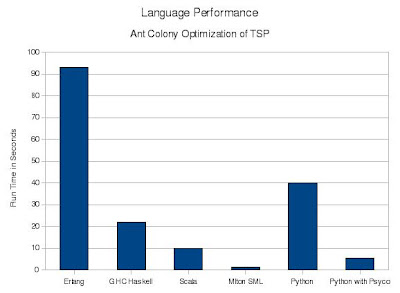Psyco is a compiler for Python. It is a just-in-time compiler, and uses the run-time type usage information to determine which functions should be native-compiled. It is a specializing compiler -- it will create multiple instantiations of the same function with different type parameters. It is very easy to use; just add 2 lines to the top of your program:
import psyco
psyco.full()
It is an experimental project. The documentation warns that map and lambda perform poorly, and that list comprehensions (often a reasonable substitute) should be used instead. The original developer has moved on to work on the PyPy project; I should investigate that later.
Compared to other tested languages the performance of uncompiled Python is average; with Psyco compilation it is surprisingly good.

Erlang Haskell Scala MLton_SML Python Psyco
93 22 10 1.5 40 5.5
All times in seconds.
Update 7/12
Leonardo Maffi has pointed out numerous potential style and performance improvements for the Python code. Turns out Python already has a zip function (hard to find the info searching www.python.org, mixed with the zip file functions :-), so I have removed my implementation from the code. No performance change with my zip removed.
Update 7/15
See new post on Shedskin Python.
5 comments:
Have you tried "Ludicrous":
http://rubystuff.org/ludicrous/
no, haven't tried Ludicrous Ruby yet...
Any chance you can compare you results with natively compiled erlang ? add the -native option to erlc.
It would be interesting to see how much it makes a difference and compares to the other languages.
I discussed Erlang HiPE/native compilation in earlier posts. Basically HiPE didn't speed up the code at the time, isn't compatible with SMP, and (June 2008) isn't available in the binary from Debian apt-get.
Turns out Erlang HiPE is available in Debian as a separate package (erlang-base-hipe), and is now SMP compatible. But the speedup is only 5%, or 11% if you also native compile dict.erl.
Post a Comment